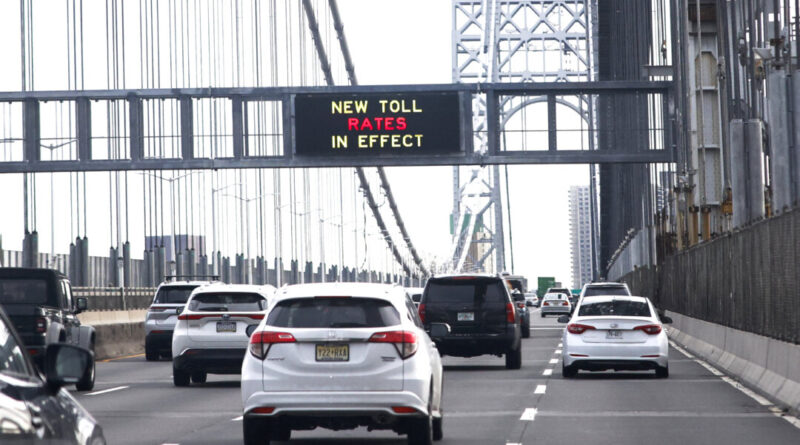Manhattan Toll Continues to Operate Despite Trump Administration’s Deadline for Elimination
The toll mandates that working-class citizens pay to ‘use roads their federal tax dollars have already funded,’ according to the transportation secretary.
A deadline set by the Trump administration for local authorities to eliminate a toll imposed on drivers in Manhattan, New York City, by April 20 has not been fulfilled.
The toll rates vary during off-peak hours based on traffic levels, with trucks, taxis, buses, motorcycles, and rideshare services like Uber also included in the tolling system.
Both Governor Kathy Hochul’s office and the MTA confirmed on Sunday that the traffic camera system is still operational and continues to collect fees from most vehicles entering the borough below Central Park.
“The cameras will remain operational,” stated Hochul’s spokesperson Avi Small.
John J. McCarthy, the MTA’s chief of policy and external relations, remarked, “To clarify, MTA, State, and City reaffirmed in a court filing that congestion pricing is here to stay, and the claims made by Secretary Duffy against it lack validity.”
The DOT indicated it would not remove the deadline despite the legal proceedings, asserting it would “not hesitate to use every avenue” available should the state neglect to eliminate the toll.
The MTA contends that the toll fees are crucial for funding improvements to the city’s outdated transit infrastructure.
Hochul has stated previously that the revenue would support $15 billion in debt financing for improvements in mass transit, allocating 80 percent of the funds for the subway and bus systems, and 20 percent for two commuter rail lines.
The Trump administration opposed the toll based on concerns it would adversely affect small businesses and average Americans.
Duffy also criticized Hochul’s “refusal to eliminate cordon pricing” and her “open disrespect towards the federal government as unacceptable.”
The New York State Department of Transportation (NYSDOT) has been granted 30 days to justify how its noncompliance is not illegal.
If the tolls are not terminated by this deadline, or if the Federal Highway Administration (FHWA) finds that New York is out of compliance after reviewing NYSDOT’s explanation, the agency will undertake various measures,
This could mean halting further “advance construction” projects in Manhattan and suspending National Environmental Policy Act approvals for any projects in the borough, unless these projects are deemed essential for safety, the agency noted.
Should noncompliance persist, more stringent actions will be taken, including terminating approvals for certain projects within New York City, the DOT stated.
The corrective measures “could extend to other areas across New York if noncompliance continues,” the DOT added.

Cars pass under E-ZPass readers and license plate-scanning cameras on the George Washington Bridge as congestion pricing takes effect in New York City on Jan. 5, 2024. Kena Betancur/AFP via Getty Images
MTA Versus DOT
In its lawsuit against the federal government, the MTA argued that the FHWA, a division of the DOT, had already authorized the Value Pricing Pilot Program (VPPP) which allowed the congestion toll to be implemented in November 2024.
The MTA criticized the Trump administration’s attempts to revoke the congestion pricing, labeling them as “illegal.”
The defendants in the case, which include the DOT, FHWA, and Duffy, have not provided any justification for their reversal on the program despite its prior approval just months earlier, the MTA contended.
“Neither the VPPP Agreement nor applicable laws permit FHWA to unilaterally terminate the VPPP Agreement,” the lawsuit stated.
“This is reasonable. If the FHWA had the right to unilaterally terminate a VPPP program that had already received approval and been put into effect, it would create unpredictability concerning the future of such programs every time leadership changed at FHWA, USDOT, or the White House—an uncertainty that could hinder the issuance of bonds for future projects and would clearly undermine the goals of the VPPP.”
The termination of the VPPP agreement represents “a blatant disregard for numerous federal laws and regulations” while also violating the rights of the MTA as outlined in the U.S. Constitution, the complaint argued.
He emphasized that toll rates established under the VPPP “should not primarily be influenced by revenue goals.”

Signs advising drivers of congestion pricing tolls are displayed near the exit of the Lincoln Tunnel in New York City on Feb. 19, 2025. Seth Wenig/AP Photo
Duffy acknowledged that the Federal Highway Administration under the Biden administration had considered the congestion pricing policy to be eligible for approval under the VPPP initiative.
He noted that the Federal Highway Administration “did not clarify the reasoning behind its decision.”
Although the NYSDOT and the Triborough Bridge and Tunnel Authority (TBTA) have relied on the VPPP agreement to impose tolls, Duffy argued that such reliance “should not obstruct the termination” of the agreement.
While the NYSDOT and TBTA “have incurred expenses associated with the program, many of these were incurred” prior to the agreement being signed. The Federal Highway Administration “is not aware of any significant costs connected with the actual stopping of the program,” the letter indicated.
The Epoch Times attempted to contact Hochul and the MTA for comment but received no response by the time of publication.




